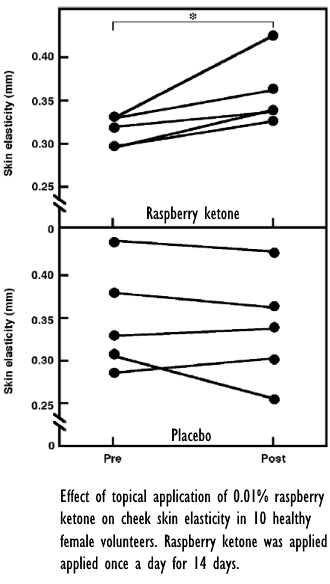TweetRaspberry ketone boosts skin's elasticity and stimulates hair growth
Readers of this website know raspberry ketone as a substance in weight loss supplements, but the same raspberry ketone may also appear in cosmetic products that should rejuvenate the skin and stimulate hair growth. That suggestion comes from an article that researchers from Nagoya City University in Japan published in Growth Hormone & IGF Research.Animal study
The researchers applied lotions with various concentrations of raspberry ketone to the skin of mice.
A part of the mice was normal (wild type), another part was not. In the latter group of mice the researchers had switched off the gene for CGRP. We will save you a long and complicated story, but this procedure prevented the animals from responding to raspberry ketone.
Raspberry ketone increased the manufacture of IGF-1 by the skin cells. The most effective concentration was 0.01 percent.IGF-1 allows cells to grow and develop. In in vitro and animal studies, hair grows faster when follicle cells are stimulated by IGF-1, and skin cells become stronger and more elastic when they are stimulated by IGF.
Nice of course. But does that also happen to people?
Human studies
The Japanese had for 5 months 10 test subjects with hair loss rub their scalp every evening with a liquid consisting of 0.01 percent raspberry ketone. Raspberry ketone was found to be effective in half of them. The figure below shows the raspberry ketone's effectiness in 4 individuals.
In another experiment, the researchers had 5 women rub their faces daily with the same lotion for 14 days. Five other women did the same, but with a lotion without active substances. The figure below shows that raspberry ketone made the skin more elastic.
Conclusion
"These observations strongly suggest that raspberry ketone might increase dermal IGF-I production [...], thereby promoting hair growth and increasing skin elasticity", the Japanese summarize.
For the do-it-yourselfers
The researchers made their lotions by dissolving raspberry ketone in a liquid consisting of 10 percent Tween-20 and 10 percent alcohol.
The raspberry ketone concentration was initially 10 percent. By diluting with a normal saline solution, the researchers brought the raspberry ketone concentration to 0.01 percent.
Source:
Growth Horm IGF Res. 2008 Aug;18(4):335-44.





 Attention Guest, if you are not a member of Fitness Geared - Body Building & Fitness Community, you have 1 new private message waiting, to view it you must fill out
Attention Guest, if you are not a member of Fitness Geared - Body Building & Fitness Community, you have 1 new private message waiting, to view it you must fill out 





























 Thanks:
Thanks:  Likes:
Likes:  Dislikes:
Dislikes: 











 Reply With Quote
Reply With Quote

